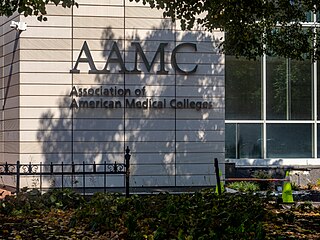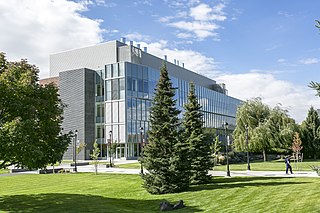
A pharmacist, also known as a chemist in Commonwealth English, is a healthcare professional who is knowledgeable about preparation, mechanism of action, clinical usage and legislation of medications in order to dispense them safely to the public and to provide consultancy services. A pharmacist also often serves as a primary care provider in the community and offers services, such as health screenings and immunizations.
A physician assistant or physician associate (PA) is a type of healthcare professional. While these job titles are used internationally, there is significant variation in training and scope of practice from country to country, and sometimes between smaller jurisdictions such as states or provinces. Depending on location, PAs practice semi-autonomously under the supervision of a physician, or autonomously perform a subset of medical services classically provided by physicians.

The Association of American Medical Colleges (AAMC) is a 501(c)(3) nonprofit organization based in Washington, D.C. that was established in 1876. It represents medical schools, teaching hospitals, and academic and scientific societies, while providing services to its member institutions that include data from medical, education, and health studies, as well as consulting. The AAMC administers the Medical College Admission Test and operates the American Medical College Application Service and the Electronic Residency Application Service. Along with the American Medical Association (AMA), the AAMC co-sponsors the Liaison Committee on Medical Education (LCME), the accrediting body for all U.S. MD-granting medical education programs.
WebMD is an American corporation which publishes online news and information about human health and well-being. The WebMD website also includes information about drugs and is an important healthcare information website and the most popular consumer-oriented health site.

A pharmacy technician performs pharmacy-related functions. Training, certification, licensing, and actual practice of pharmacy technicians varies not only worldwide but in some countries regionally as well as by employer.
A medical assistant, also known as a "clinical assistant" or healthcare assistant in the US is an allied health professional who supports the work of physicians, nurse practitioners, physician assistants and other health professionals, usually in a clinic setting. Medical assistants can become certified through an accredited program. Medical assistants perform routine tasks and procedures in a medical clinic.
The Master of Library and Information Science (MLIS), also referred to as the Master of Library and Information Studies, is the master's degree that is required for most professional librarian positions in the United States. The MLIS is a relatively recent degree; an older and still common degree designation for librarians to acquire is the Master of Library Science (MLS), or Master of Science in Library Science (MSLS) degree. According to the American Library Association (ALA), "The master’s degree in library and information studies is frequently referred to as the MLS; however, ALA-accredited degrees have various names such as Master of Information Studies, Master of Arts, Master of Librarianship, Master of Library and Information Studies, or Master of Science. The degree name is determined by the program. The [ALA] Committee for Accreditation evaluates programs based on their adherence to the Standards for Accreditation of Master's Programs in Library and Information Studies, not based on the name of the degree."
Express Scripts Holding Company is a pharmacy benefit management (PBM) organization. In 2017 it was the 22nd-largest company in the United States by total revenue as well as the largest pharmacy benefit management (PBM) organization in the United States. Express Scripts had 2016 revenues of $100.752 billion. Since December 20, 2018, the company has been a direct subsidiary of Bloomfield, Connecticut-based Cigna.
An independent medical review (IMR) is the process where physicians review medical cases in order to provide claims determinations for health insurance payers, workers compensation insurance payers or disability insurance payers. Peer review also is used in order to define the review of sentinel events in a hospital environment for quality management purposes such as to look at bad outcomes and determine whether there was any mis-diagnosis, mistreatment or any systemic problems involved which led to the sentinel event.

Graduate School USA is a private school headquartered in Washington, D.C., with regional campuses around the United States. It offers only training programs; it does not offer academic degree programs or for-credit courses. It was purchased by American Public Education, Inc. in 2021.

The American Pharmacists Association, founded in 1852, is the first-established professional society of pharmacists in the United States. The association consists of more than 62,000 practicing pharmacists, pharmaceutical scientists, student pharmacists, pharmacy technicians, and others interested in the profession. Nearly all U.S. pharmacy specialty organizations were originally a section or part of this association.
Pharmacy residency is education a pharmacist can pursue beyond the degree required for licensing as a pharmacist. A pharmacy residency program allows for the implementation of skill set and knowledge acquired in pharmacy school through interaction with the public either in a hospital setting or community practice. The program is done over a span of about 2yrs after graduation from pharmacy school and licensure as a pharmacist. Pharmacy residency helps improve the resume of a pharmacist so as to increase chances of obtaining employment outside community practice. A 2022 review suggested that there is sufficient evidence that residency develops key competencies for junior pharmacists.
Board certification is the process by which a physician, veterinarian, or other professional demonstrates a mastery of advanced knowledge and skills through written, oral, practical, or simulator-based testing.
Monmouth Medical Center, based in Long Branch, New Jersey, is one of New Jersey's largest community academic medical centers. It is an academic affiliate of Robert Wood Johnson Medical School of Rutgers University and is a part of the larger RWJBarnabas Health system. Connected to MMC is the Unterberg Children's Hospital which serves the pediatric population aged 0–21 of Monmouth County.

The Milken Institute School of Public Health is the school of public health of the George Washington University, in Washington, DC. U.S. News & World Report University Rankings ranks the Milken SPH as the 11th best public health graduate program in the United States.
Roseman University of Health Sciences is a private university focused on healthcare with its main campus in Henderson, Nevada. It has additional campuses in South Jordan, Utah and Summerlin, Nevada. It enrolled its first class in January 2001 and was originally called the Nevada College of Pharmacy and the University of Southern Nevada.

The Elson S. Floyd College of Medicine is a public medical school headquartered in Spokane, Washington. Founded in 2015, it is part of Washington State University, and is the second public medical school in the state of Washington. It welcomed its inaugural class in the fall of 2017, joining the University of Washington and Pacific Northwest University of Health Sciences as one of three medical schools in the state.
Specialty drugs or specialty pharmaceuticals are a recent designation of pharmaceuticals classified as high-cost, high complexity and/or high touch. Specialty drugs are often biologics—"drugs derived from living cells" that are injectable or infused. They are used to treat complex or rare chronic conditions such as cancer, rheumatoid arthritis, hemophilia, H.I.V. psoriasis, inflammatory bowel disease and hepatitis C. In 1990 there were 10 specialty drugs on the market, around five years later nearly 30, by 2008 200, and by 2015 300.
Specialty pharmacy refers to distribution channels designed to handle specialty drugs — pharmaceutical therapies that are either high cost, high complexity and/or high touch. High touch refers to higher degree of complexity in terms of distribution, administration, or patient management which drives up the cost of the drugs. In the early years specialty pharmacy providers attached "high-touch services to their overall price tags" arguing that patients who receive specialty pharmaceuticals "need high levels of ancillary and follow-up care to ensure that the drug spend is not wasted on them." An example of a specialty drug that would only be available through specialty pharmacy is interferon beta-1a (Avonex), a treatment for MS that requires a refrigerated chain of distribution and costs $17,000 a year. Some specialty pharmacies deal in pharmaceuticals that treat complex or rare chronic conditions such as cancer, rheumatoid arthritis, hemophilia, H.I.V. psoriasis, inflammatory bowel disease (IBD) or Hepatitis C. "Specialty pharmacies are seen as a reliable distribution channel for expensive drugs, offering patients convenience and lower costs while maximizing insurance reimbursements from those companies that cover the drug. Patients typically pay the same co-payments whether or not their insurers cover the drug." As the market demanded specialization in drug distribution and clinical management of complex therapies, specialized pharma (SP) evolved.„ Specialty pharmacies may handle therapies that are biologics, and are injectable or infused. By 2008 the pharmacy benefit management dominated the specialty pharmacies market having acquired smaller specialty pharmacies. PBMs administer specialty pharmacies in their network and can "negotiate better prices and frequently offer a complete menu of specialty pharmaceuticals and related services to serve as an attractive 'one-stop shop' for health plans and employers."
Diplomat Pharmacy, Inc. is the largest independent provider of specialty pharmacy services in the United States. The company partners with manufacturers, payers, providers, hospitals, and more. Headquartered in Flint, Michigan, Diplomat has facilities across the United States and dispenses drugs in all 50 states. Diplomat offers specialized medication and medication management programs for patients with complex and chronic conditions such as cancer, hepatitis, multiple sclerosis, HIV and others.







